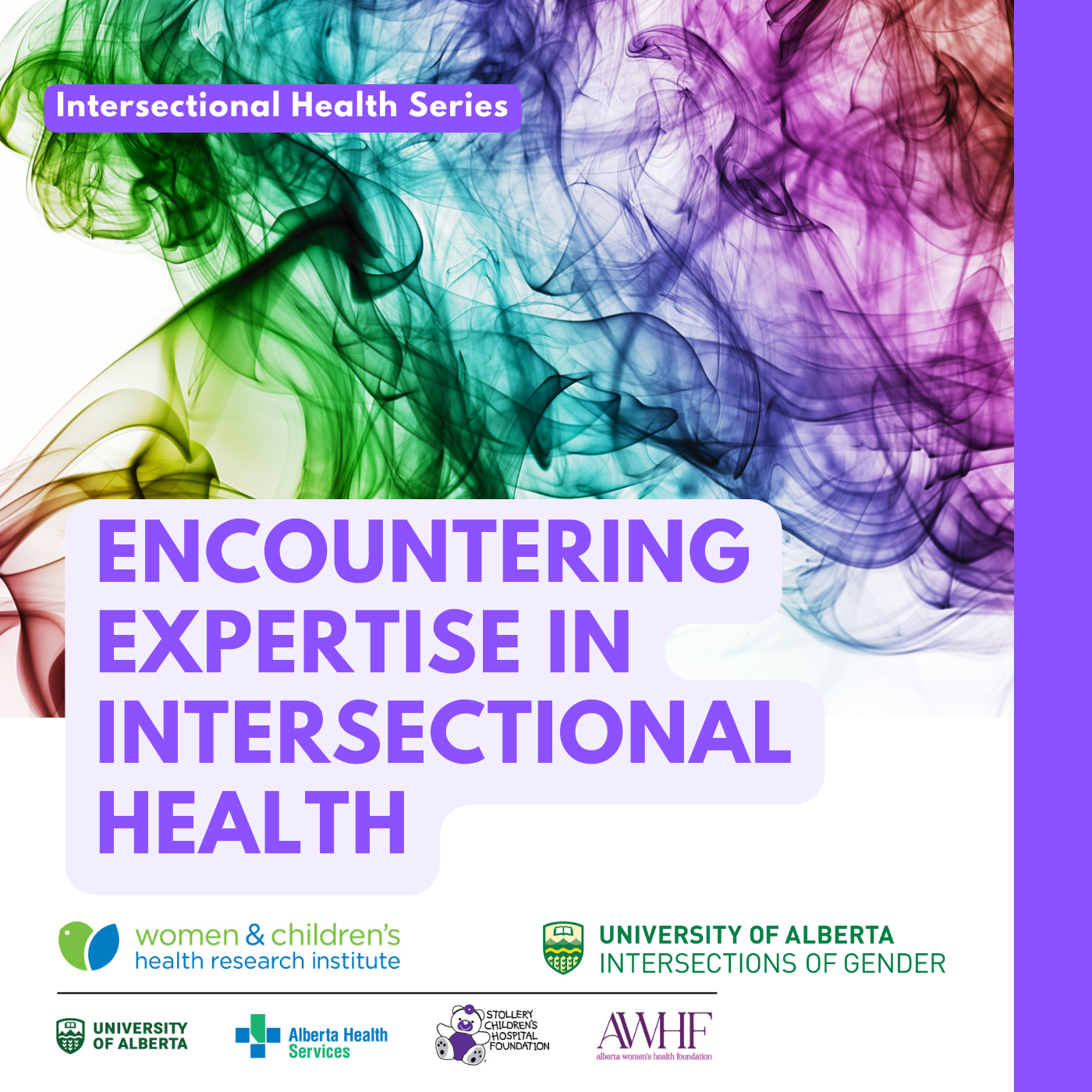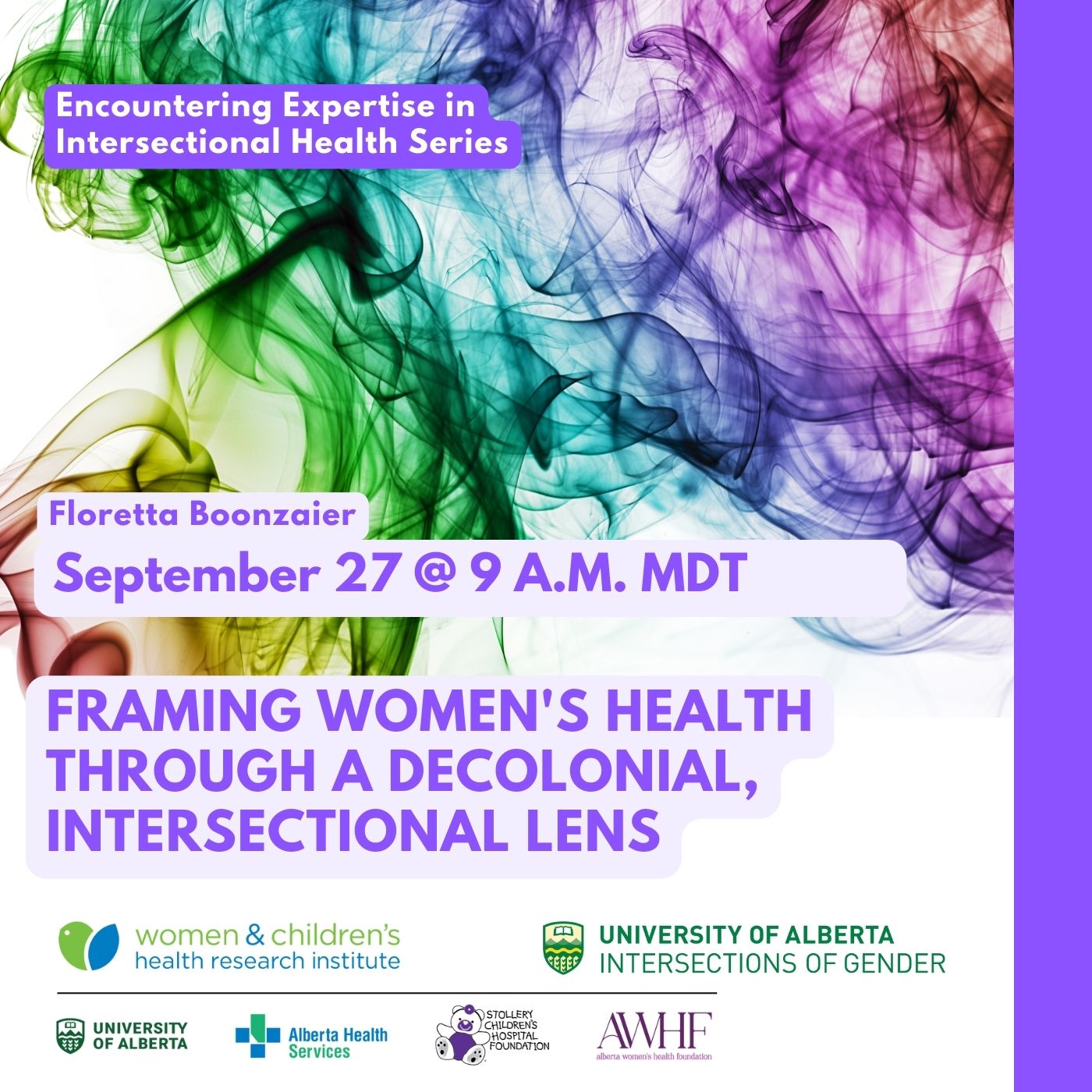Encountering Expertise in Intersectional Health Series

Intersectionality: Qualitative and Quantitative Research Design

Health and social inequities exist across the globe, including Canada. The COVID-19 pandemic has further highlighted the need to consider the impact of intersectional social locations on health and social outcomes. For example, racialized women are multiply impacted by the pandemic due to intersectional influences of gender and race. Intersectionality considers how multiple intersecting locations including race, gender, and income can intersect to contribute to experiences and outcomes. The presentation will begin with basic information about intersectionality, including the history of intersectional theoretical perspective. We will discuss how intersectionality has been used in health and social service research and practice as it relates to women and children.
In this session, you will gain a basic understanding of intersectionality, including the history of intersectional theoretical perspectives. The session will also introduce and discuss how intersectionality has been used in health and social service research and practice as it relates to women and children.
This session meets requirements for the Canadian Child Health Clinician Scientist Program (CCHCSP) training curriculum.
Panelists
Susanne Luhmann
Susanne Luhmann is Associate Professor in the Department of Women’s and Gender Studies at the University of Alberta. From 2018 to 2020, she was the inaugural Director of Intersections of Gender, Signature Area of Research and Teaching at the University of Alberta, Office of the Vice President (Research and Innovation). She has teaching and research interests related to the institutionalization of intersectional gender studies and research; feminist and queer pedagogies, trauma and cultural memory; and sexuality studies.
Her research has been published in the UK, Germany, Türkiye, the US, and Canada in journals such as Jahrbuch Frauen- und Geschlechterforschung in der Erziehungswissenschaft, Topia, Atlantis, Yearbook of Women in German, and New German Critique, as well as in many book chapters. Together with Amber Dean and Jennifer Johnson, Luhmann co-edited Feminist Praxis Revisited: Critical Reflections on University-Community Engagement (Wilfrid Laurier University Press, 2019). She is co-author of Troubling Women’s Studies: Pasts, Presents, Possibilities (Sumach Press, 2004).
Denise L. Spitzer
A critical feminist medical anthropologist, Denise L. Spitzer PhD, is a Professor in the School of Public Health at the University of Alberta and an Adjunct Professor in the Institute of Feminist and Gender Studies at the University of Ottawa, where, from 2005-2015, she was the Canada Research Chair in Gender, Migration and Health and a Principal Scientist in the Institute of Population Health. In addition to undergraduate studies in Biology, Chinese Language, and Music, she holds a Master’s degree and doctorate in Anthropology from the University of Alberta. Engaging in participatory research with migrant communities around the world, Dr. Spitzer is interested in examining how global processes, mediated through intersectionality, are implicated in health and wellbeing and experienced and expressed at the level of the body. Her current program of research focuses on the impact of the global economy and multiple levels of policy-making on immigrants, migrants and refugees in different parts of the globe, most notably Southeast and East Asia, Canada, and the Horn of Africa, and engages with critical perspectives of the body, transnationalism and constructions of identity. She is the recipient of 31 research grants as principal investigator and 38 as co-investigator, and experience facilitating numerous multinational and multilingual participatory research projects. Professor Spitzer has published in journals such as Gender & Society, Medical Anthropology Quarterly, and the Canadian Journal of Public Health. Her edited collection, Engendering Migrant Health: Canadian Perspectives (University of Toronto Press, 2011) was cited as one of the best policy books of 2011 by the Hill Times and was awarded a WGSRF Outstanding Scholarship citation by the Women’s and Gender Studies Association in 2013.
Bukola Salami
Bukola Salami is Associate Professor at the Faculty of Nursing, University of Alberta and the current Director at the Intersections of Gender Signature Area. Her research program focuses on policies and practices shaping migrants’ health and has been involved in about 80 funded research projects. She is the lead on around 30 of these projects with funding from national and international agencies. She has led research projects on vaccine confidence among Black Canadians, COVID-19 disinformation among Black Canadians, African immigrant child health, immigrant mental health, access to healthcare for immigrant children, Black youth mental health, international nurse migration, immigrant child mental health, the experiences of live-in caregivers and care recipients, the experiences of temporary foreign workers, internally displaced people, and parenting practices of African immigrants. She has around 80 published scholarly articles in peer-reviewed journals (with another 15 under review), 2 book chapters, and 8 reports. She is an Associate Editor for the Canadian Medical Association Journal and also a member of the advisory board of the Canadian Institutes for Health Research Institutes for Human Development, Child and Youth Health.
Presentation Slides - Susanne Luhmann
Presentation Slides - Denise L. Spitzer
Presentation Slides - Bukola Salami
May 10, 2022 - Intersectionality: Qualitative and Quantitative Research Design

Intersectionality theory has been used by health service researchers to bring to light how intersecting systems of oppression contribute to health experience. Despite this, there is limited understanding of how to conduct intersectionality research. We will discuss key considerations in incorporating intersectionality into qualitative and quantitative research design, including on women and children's health.
Panelists
Joya Misra is Professor of Sociology and Public Policy and Director of the Institute for Social Science Research at the University of Massachusetts. For almost three decades, her research has focused on intersectionality by race, gender, class, parenthood status, and nationality in workplaces, higher education, and at the societal level, using both quantitative and qualitative methods.
Dr. Daniel Holman is a lecturer in Sociology and Public Health at the Department of Sociological Studies at the University of Sheffield, where he co-leads the Well-being and Health Across the Life Course research theme. He is also Research Fellow for the university’s Healthy Lifespan Institute. He was Principal Investigator for the ESRC funded project “Chronic disease and healthy ageing at the intersections: social locations, biomarkers, and health practices.” Dr. Holman's research focuses on health inequalities, social determinants, intersectionality, and the life course.
Tim Huijts is research leader at the Research Centre for Education and the Labour Market (ROA) at Maastricht University School of Business and Economics. As of April 2021, he also holds a part-time position (0.2 FTE) as Professor of Sociology at the Centre for Global Health Inequalities Research (CHAIN) in Norway (ntnu.edu/chain). He obtained an MSc (2006, cum laude) and PhD (2011, cum laude) in Sociology at the Radboud University Nijmegen. Before joining ROA in April 2018 he worked as Assistant Professor at Utrecht University, Postdoctoral Researcher at the University of Oxford, Lecturer at Queen Mary University of London, and Senior Lecturer at the University of York. In his research he examines how national and institutional factors influence social inequalities, and how these factors moderate the impact of education and employment on outcomes such as health and well-being. His work has appeared in a broad range of journals in Sociology, Demography and Public Health. Additionally, together with international colleagues he designed the rotating module on ‘Social inequalities in health and their determinants’ for the 7th wave of the European Social Survey (2014), which will be repeated for the 11th wave (2022). His research was rewarded with a Philip Leverhulme Prize (2017) for outstanding achievement.
September 27, 2022 - Framing Women's Health through a Decolonial, Intersectional lens: Reflections from research on gendered and sexual violence

In this session, we welcome esteemed Professor of Psychology, Dr. Floretta Boonzaier (University of Cape Town) to focus on how women's health research and outcomes benefit from the lenses of decolonialism and of intersectionality, particularly as they relate to gendered and sexual violence. This conversation will be hosted by Dr. Colleen Norris (University of Alberta), Associate Dean of Research in the Faculty of Nursing and Cavarzan Chair in Mature Women's Health, Faculty of Medicine and Women and Children's Health Research Institute, and expert in women's heart health.
Panelists
Floretta Boonzaier is Professor of Psychology at the University of Cape Town, and co-Director of the Hub for Decolonial Feminist Psychologies in Africa. She is also the incoming President of the Psychological Society of South Africa. She is noted for her work in feminist, critical and postcolonial psychologies, her research on subjectivity in relation to race, gender and sexuality, and her work on gendered and sexual violence, and decolonial research methodologies. She is an Associate Editor for the South African Journal of Science and past Editor in Chief for the journal Psychology in Society. She is a past UCT Mandela Fellow at the Hutchins Center for African and African American Research at Harvard University and a past recipient of the runner up award in the South African Department of Science and Technology’s Women in Science awards, for the category of Distinguished Young Woman Researcher in the Social Sciences or Humanities. She serves on the Board of Mosaic Training, Service and Healing Centre for Women in Cape Town and the African Gender Institute and Huma Institute at the University of Cape Town. Her recent publications include the co-edited volumes Engaging youth in activism, research and pedagogical praxis: Transnational and intersectional perspectives on gender, sex and race (Routledge, 2018), Decolonial Feminist Community Psychology (Springer, 2019 ), Men, Masculinities and Intimate Partner Violence (Routledge, 2020) and the co-authored book, Pan-Africanism and Psychology in Decolonial Times (Palgrave Macmillan, 2021).
Dr. Colleen Norris is a Professor and Clinician Scientist with University of Alberta’s Faculties of Nursing, Medicine, and School of Public Health, Associate Dean of Research, Faculty of Nursing, UAlberta, and Cavarzan Chair in Mature Women's Health, Faculty of Medicine, UAlberta and Women and Children's Health Research Institute. Her PhD is in clinical epidemiology. Dr. Norris, a nurse by training, completed post-doctoral training with the Canadian Cardiovascular Outcomes Research Team (CCORT) and Tomorrows Outcome Researchers in Cardiovascular Health (TORCH) in health outcomes research and developed the Alberta Provincial Project for Outcome Assessment in Coronary Heart Disease (APPROACH) follow-up program. Dr. Norris is the former Scientific Director of the Cardiovascular Health and Stroke Strategic Clinical Network for Alberta Health Services. Her program of research focuses on the sex and gender factors that impact women’s heart health. She is the past Chair of the Canadian Women’s Heart Health Alliance (CWHHA) Health Policy and Services (HP&S) working group, whose mandate is to implement policies that advance our understanding of the unique sex and gender factors affecting the outcomes of women’s heart health. She is a committee member on the Women’s Heart and Brain Health Network Research Steering Committee, and is actively involved in advancing sex and gender-based analysis and reporting in Heart & Stroke funded research. In 2018, Dr. Norris was designated as the sex and gender champion on the CCS clinical guidelines committee where she established and published a methodology that is used to incorporate sex and gender specific information into CCS clinical practice guidelines. Dr. Norris is a Fellow of the American Heart Association and the CO-PI in a CIHR/GENDER-NET Plus research project- GOING-FWD, an international collaborative of researchers from five countries, evaluating the impact of sex and gender factors on outcomes. Dr. Norris has mentored over 80 students/trainees. She has presented extensively and has over 300 publications in the areas of sex and gender differences in cardiovascular treatment and outcomes, and women’s heart health.